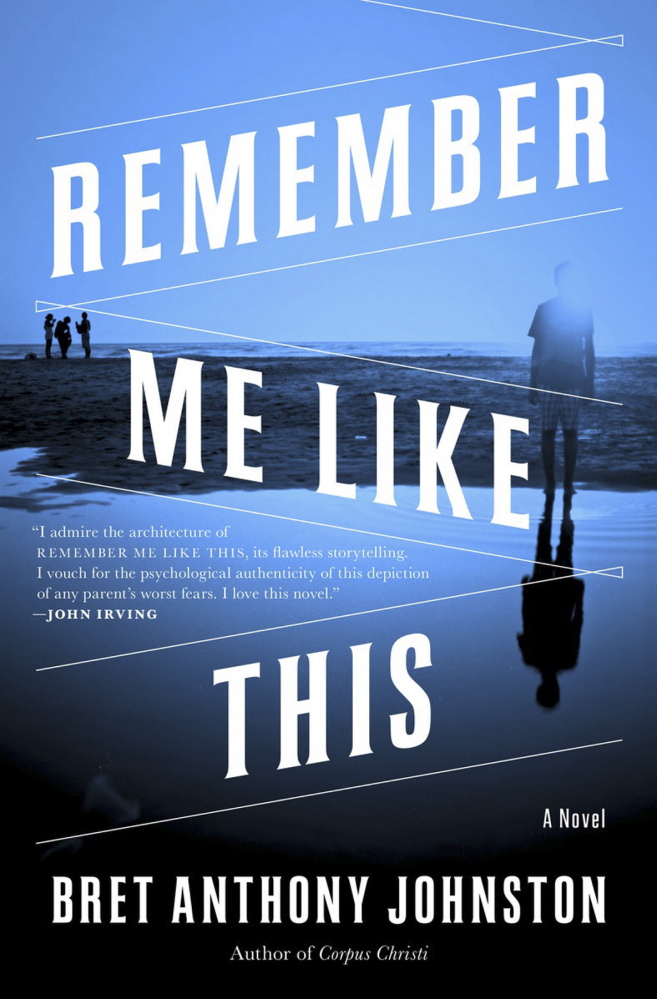A page-turner of a plot alone usually is not enough to keep me reading long into the night, abandoning my dreams for a writer’s creative imaginings. Bret Anthony Johnston delivers the special something that makes a book worth losing sleep over: a masterfully designed architecture of psychological truths and observations that build ironclad believability.
Just a couple of chapters into “Remember Me Like This,” I cared enough about the family to live in this novel until Johnston delivered the final word. Like the best contemporary American authors, he abstains from sermonizing and builds his story with description and the accumulation of telling details.
From the opening chapters, I began to wonder about the author; he would surely have to be from South Texas to deliver such an intimate sense of place. Johnston, a graduate of the Iowa Writers’ Workshop and a recipient of a National Endowment for the Arts Literature Fellowship, is the director of creative writing at Harvard University. Johnston’s “Corpus Christi: Stories,” a collection set in the town where he grew up, was published in 2004.
The author returns to the Texas Coastal Bend area as the setting for his debut novel. He drops familiar names and locations: Whataburger, HEB grocery stores, Alamo Fireworks stands, Ingleside, Mustang Island.
Suffering the region’s searing summer heat is a continuing theme, and Johnston surely writes from experience when describing how a hot car seat can burn right through denim jeans. “On the beach,” Johnston writes, “people tried holding out for a breeze from the Gulf, but when the gusts blew ashore, they were humid and harsh, kicking up sand that stung like wasps.”
The story begins with what other novels would offer as a happy ending: almost-16-year-old kidnapping survivor Justin is returned to his family after four years. By the time he returns home, Justin’s parents, Eric and Laura, are disfigured by grief, shame, fear, anger – the whole gamut of emotions associated with losing a child.
They have been diminished by the “pitiful and sadistic glances” of sympathetic neighbors, and from feeling defined by Justin’s absence.
Neighbors notice the grieving Eric looks slackened after years of trying to keep the faith, of working with the police and continuing to post missing-child fliers everywhere. “Each week there seemed a little less of him.”
Justin’s family initially revels in the renewal and elation of having Justin back. Laura seems reincarnated after an emotional death and returns to her role at the heart of the family.
All of them, including younger brother Griff, are reanimated by Justin’s return and are somewhat in awe of him. “Eric wasn’t yet accustomed to seeing him again, and everything that his son came in contact with seemed to radiate, to shine in new and pure ways.”
Inevitably, however, the family is retraumatized when some of their fears about how Justin was treated by his captor are slowly confirmed. Laura studies up on Stockholm syndrome. Eric stakes out the kidnapper’s family. A trial looms. Justin confides in Griff, and the sometimes gritty process of the brothers renewing their bond feels painfully real.
Meanwhile, Justin’s grandfather, Cecil, “didn’t know what people thought when they saw him. For the last few years, he’d been the Missing Boy’s Grandfather.… It wasn’t lost on him that this abrupt lassitude, this compounding of time and the sapping it had visited upon him, was hitting so soon after Justin came back.”
In Johnston’s hands, the happy ending of a son returned home is the beginning of a story that evokes reflections on what it means to be lost. Johnston illustrates that only the lucky few get a chance to learn firsthand that pain is associated with being found.
Only the lucky few learn to be grateful for everything – grateful even for the tears that flow when we more fully understand the folly of taking family for granted.
Send questions/comments to the editors.



Comments are no longer available on this story